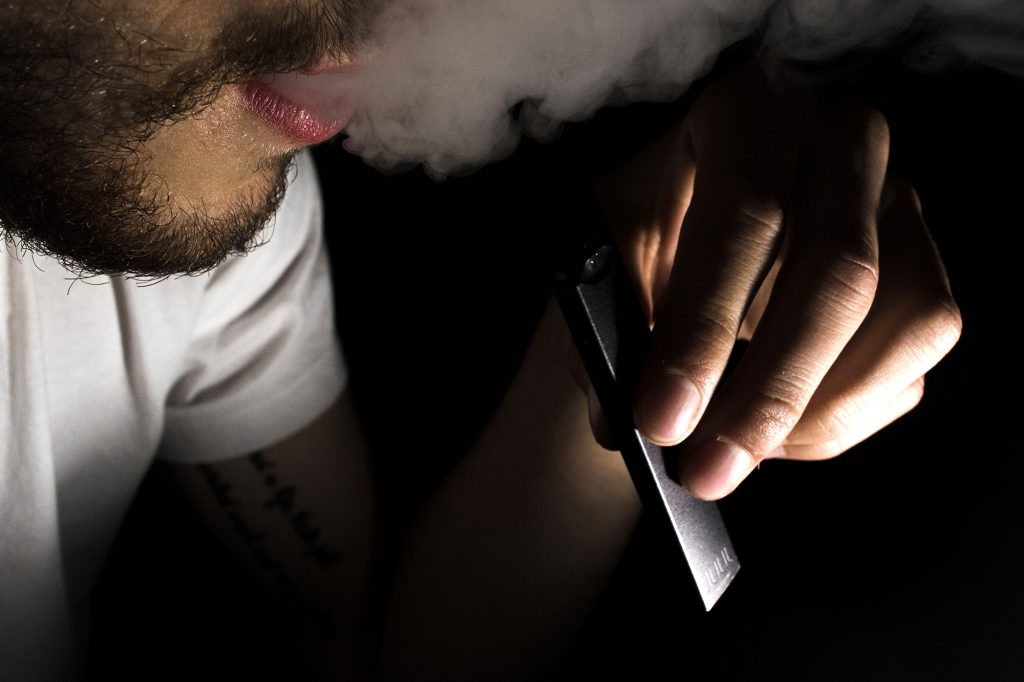The Food and Drug Administration released a statement on April 24 regarding new enforcement actions on the sale and use of e-cigarettes (namely JUUL) by underage individuals. The move is part of its comprehensive plan for tobacco and nicotine regulation that was announced in July 2017. In the statement, the FDA cited 40 retailers around the nation for selling JUUL products to minors.
Along with citing retailers, the FDA is also investigating the San Francisco company JUUL Labs Inc. for potentially targeting minors. The FDA said in its release that the JUUL e-cigarette helps “facilitate youth use” with such characteristics as the physical design, difficult-to-see emissions, and high levels of nicotine.
In a letter to JUUL, the FDA requested documents “relating to marketing practices and research on marketing, effects of product design, public-health impact, and adverse experiences related to JUUL products.” The FDA also claimed the JUUL product to be “common in middle and high schools.”
UI Associate Deam Shelly Campo told The Daily Iowan that tobacco companies have a well-documented and researched history of targeting minors with their advertisements.
“The tobacco industry wants their customers to start as young as possible to increase their likelihood of lifelong customers,” Campo said in an email.
Responding to the release, JUUL launched a $30 million campaign on April 25 to combat underage nicotine use. The company is forming a group of experts led by Iowa Attorney General Tom Miller.
Miller has been an opponent of the tobacco industry for many years. Miller led the charge in the Tobacco Master Settlement Agreement in 1998, alongside the attorneys general of 45 other states. The settlement led to the cessation of many tobacco-marketing practices, including the direct and indirect targeting of youth.
“JUUL has pledged to work with me and others to keep their products from kids,” Miller said in a press release. “This is an opportunity we have never had before.”
Miller also sees potential in the popularization of e-cigarettes.
“Tom is a big supporter of e-cigarettes as an alternative,” said Lynn Hicks, the communications director for the Attorney General’s Office. “He is sending a message to adult smokers: If you can’t quit, consider e-cigs.”
Hicks said studies have shown e-cigarettes to be at least 95 percent less harmful than combustibles.
Miller’s interest with JUUL started when he began seeing the product “catch on” with smokers. JUUL asked Miller to collaborate with them based on his leadership in the issue of underage prevention.
“Tom is concerned about underage use of JUUL, and so is JUUL,” Hicks said. “JUUL supports raising the minimum age of buying nicotine containing products to the age of 21.”
While Miller believes underage use may be an issue, he does not believe it is as pressing as many have seen.
“It is cause for concern,” Miller said. “But it has not reached panic or epidemic stages. The best indicator of this is the only good data available on youth use of JUUL — that provided by the Truth Initiative. For 15- to 17-year-olds, only 7 percent have ever tried or used JUUL in their lifetimes. And JUUL use is concentrated in higher socioeconomic areas.”
The FDA is continuing its efforts against underage nicotine use alongside the FTC, issuing warning letters to the makers of 13 products, including those with flavoring that could entice minors. The FDA also plans to continue its investigation into the selling of JUUL products.



